Dramatis persona*
 Helen Chick
Helen Chick
I've always wanted a bumper sticker that said "I'm a female, LDS/Mormon, Scout leading, geocaching, piano-playing, bicycling, mathematics educator with a PhD in maths ... and I VOTE"! I think this makes me a minority group of cardinality 1!
* Since there's only one of me and "personae" is plural (I think), I've gone with dramatis persona.
|
The quantitative vs qualitative debate
There was a Faculty post-graduate research conference held on Saturday, which allowed our students to present aspects of their research to an audience of staff, fellow students, and others. Someone decided it would be a good idea to conclude the conference with a humorous debate, tackling the classic topic about which research methodology is better: qualitative or quantitative. Given my mathematical interests I was nominated to argue the quantitative case (which is slightly peculiar, because a lot of my work has qualitative aspects), but me — being me, with a penchant for irony — thought I might try to make my case in verse … until I discovered that my opponent, who teaches English and literacy, is also a poet. I decided to stick with my plan anyway — although with a greater degree of apprehension about whether I could carry it off, or what would happen if he decided to make his case in verse as well — and then it took me far too long to write the poem. There was a moment of panic when I had run out of time and ideas, having produced only five minutes of material for my ten minute gambit (I reckon I would have needed 30 stanzas to cover ten minutes … and that was just tooooooo much work). Fortunately I managed to find some appropriate filler for the first half. Fortunately, too, my opponent’s witty opening was non-poetical, and my poem with accompanying PowerPoint slides of (mostly fake) statistics went down well. It’s not entirely clear who won the debate, as the phone poll at the end had us tied! This seems apt, somehow, since most people use a mix of both approaches in their research anyway.
For posterity’s sake (not that I have any, and who knows if it/they would care about the debate if I did), here is the poem with the slides interspersed roughly when they would have been displayed on screen. This isn’t the best of my poems — it is rather uneven and the meter is sometimes higgledy when it should be piggledy — but it does enough I think.
To those who’ve heard this conference call,
We’re here to see, for once, for all,
Just which of two approaches might be best.
Examiners will surely know
Which PhDs are good to go
Then speedily decide to chuck the rest.
Is qualitative quite absurd?
It focuses upon the word,
The wishy-washy and the ill-defined;
While quantitative, clean and pure,
Its certainty will reassure
Despite the claim its stats are used to blind. |
|
It really comes as some surprise
That these debates again arise
The battle has been fought before and won;
Yet every time we’ve been ahead
The others say they knocked us dead
Which shows a TALLY needed to be done.
So let’s begin right at the start
You think you’re ready to depart
On journeys that will fix the whole world’s flaws.
Some situation or contention
Has provoked your research question
Which MUST be stated clearly … then, because |
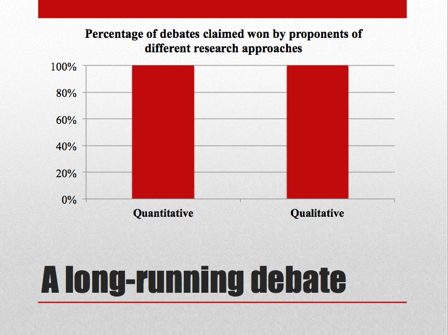 |
The BEST things to investigate,
In questions that you formulate,
Ask what is “best” or “optimal” or “more”;
And THAT requires that you must measure
With NUMBERS — oh, such glorious pleasure —
The only ways in which you can be sure |
 |
That you have managed to detect
A proper cause, and its effect:
You graph it, and you see a correlation.
A strong confirming upward trend
Should stymie sceptics in the end
’Cos x and y make SUCH a combination. |
 |
Or when you know you must compare,
To seek and find a difference there,
Is one group that much better than a second?
What factors may have played a role?
Stats help you to achieve your goal
To show hypotheses are how you reckoned. |
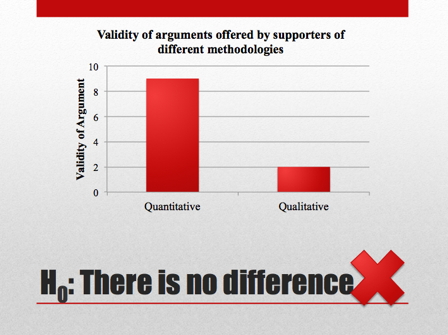 |
If you have more than one statistic
With graphs it’s time to go ballistic
To illustrate your various bits and pieces;
And since you know a picture’s worth
A thousand words; if you unearth
100 graphs then you have got your thesis.
There’s nothing more magnificent
Than results that are significant,
When p is less than nought point zero five.
This really is good evidence
That you have found a difference—
The standard to which all of us should strive. |
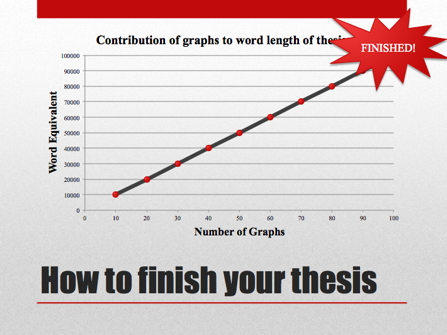 |
Completing an analysis
With software like SPSS,
A quantitative process can reveal
The factors that might underlie
The outcomes, or the reasons why,
One case appears to be the better deal. |
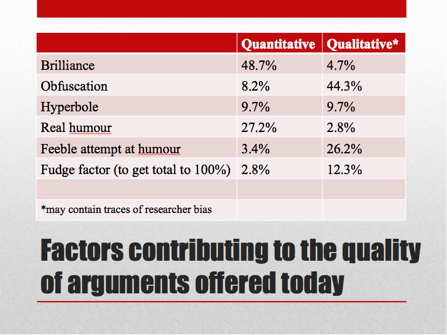 |
I must, however, give a warning
If your desire for graphs is dawning,
Just take the time to get some good advice. |
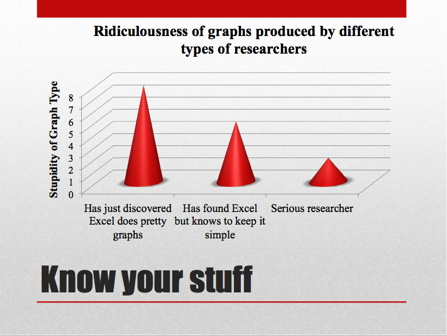 |
Ensure that you have lots of data
Lest research be a sad non-starter
And end up proving nothing, which ain’t nice. |
 |
This conference taught me new statistics
Systemic Functional Linguistics
Which aims to analyse the words we write. |
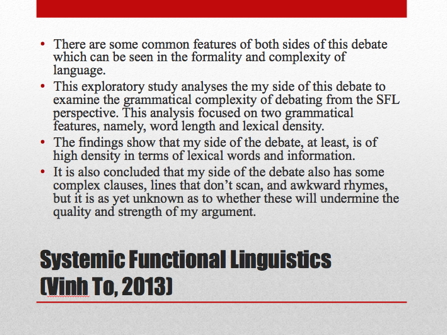 |
So here I’ve chosen to immerse us
In a graph that shows these verses
And PROVES my argument has strength and might. |
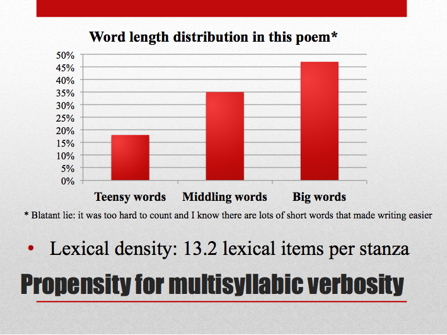 |
My colleague, like so many do,
Manages to misconstrue
The famous quote, oft taken to condemn:
When “Lies” are followed by “Damned Lies”
Then here’s my word shared with the wise:
The word “Statistics” CLEARLY CONTRASTS them. |
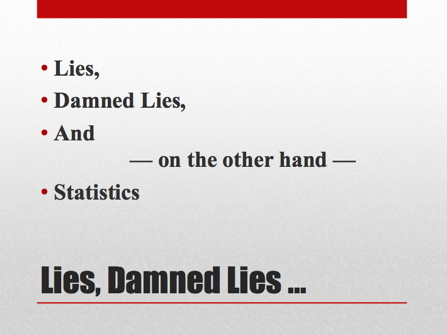 |
If you see a box, then tick it;
If you need a scale, use Likert;
Go ape for Survey Monkey if you must.
Design, with care, each key distractor,
So you’ll identify each factor
And end with strong results we’ll surely trust.
So wake yourselves from word-filled slumber;
Embrace the myriad joys of number;
Statistics really make things evident.
So go beyond the single case;
Good numbers always win the race
My confidence is 95%. |
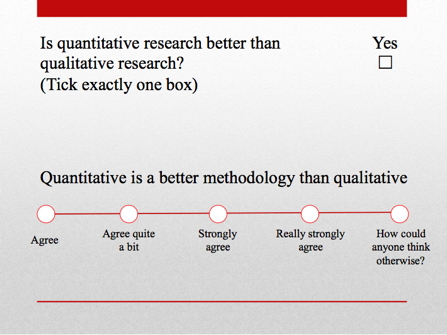 |
|
|
 Helen Chick
Helen Chick












… which all explains why you spend only 5.69% of your allotted 24 hours per day asleep!
Wow. Just… Wow.
I sit here at my desk stifling laughter. That was brilliant. Awesome.
Classic! Wish I’d been there to hear it in person.
This debate was absolutely golden! A highlight of the day, but also a highlight of the social life of the Faculty. Although it was not recorded, neither will it be soon forgotten. Well done and thank you, Helen!